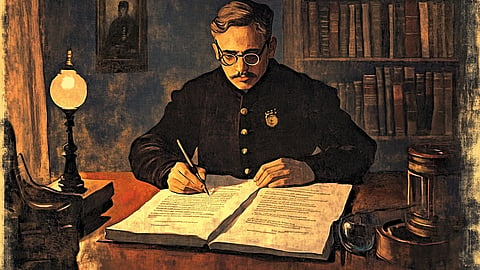- Commentary
- History Vignettes
- Notes on Culture
- Dispatches
- Podcasts
- Indian LanguagesIndian Languages
- Support

AFTER OUTLINING his cosmic vision for writing a comprehensive and truthful history of India firmly rooted in the Sanatana ethos, P.V. Kane drops a bomb.
It may appear to a casual observer that research work is being done and there is no need to extend it still more. But this is far from being correct. The field for research in India’s past is so vast and the material actually brought to light and which is still lying undiscovered in Archaeology, Vedic and Classic Sanskrit Literature, Philosophies, religious sects, Arts, ancient institutions, social life is so immense that only a fringe of the whole has been touched so far.
Here, we notice Kane’s characteristic spirit of incessant Karma Yoga. Only Rishis like him could speak with such authority. Indeed, P.V. Kane was the same colossus who had authored the monumental, five-volume treatise on the history of the Dharmasastras running into more than 6,000 pages. In the epilogue to its final volume, this is what he writes:
I could not arrange or plan my life. I had to oscillate between education, literature and law, between Government service and an independent profession like that of law. I have, however, lived a very active, full and varied life for over sixty years. Thinking over the vast Sanskrit literature and the labour and time that I had to spend on one branch of it, I am inclined to close this Epilogue with two lines from Browning’s poem: “Look at the end of the work, contrast The petty done, the undone vast.”
It is the same experiental advice that he proffers in his speech:
"There are extensive fields for work where hardly any Indian has made any substantial contribution. There is not a single Indian scholar who has studied Egyptian or Babylonian antiquities and made independent investigations into their relation to the Indus Valley civilization or their influence, if any, on Indian life in any sphere at any time. French and Dutch scholars have brought to light the wonderful monuments of Indo-China and Indonesia which owe their existence to the transmission of Indian culture and civilization to those regions…The same is the case with the spread of Sanskrit Literature and Indian culture to various parts of central Asia and Chinese Turkestan.
The reasons for this state of things are quite obvious. True research requires learned leisure and is costly, while Indian scholars are themselves poor. It is only Government or bodies like Universities or rich patrons that can provide facilities for study in the above subjects. No Indian University has endowed any chair for Egyptian or Babylonian antiquities nor given any Fellowships or scholarships to young and brilliant Indians for visiting the lands of Egypt, Babylonia or Indo-China and for making a study on the spot and in centres in the West where facilities for study exist. Thousands of Sanskrit works were translated into Tibetan and Chinese. The original Sanskrit works are almost all lost. There are hardly any facilities anywhere in India for the study of Tibetan and Chinese by Sanskrit scholars except at Santiniketan…" [Emphasis added]
After this ominous assessment, Kane expresses great hope and optimism for the future. The words have a quality of physical pain when we read them today:
Now that we are going to have a thoroughly national Government in the near future, we should agitate for the foundation of a central Research Academy at the capital and in three or four provincial cities where there is adequate provision for the study of Indian culture. Literature and monuments in India and outside in all aspects on the fullest possible scale will be made.
Sure, we got a national Government in 1947. But it was a national Government only in the administrative sense. In its policies and behaviour, it turned out worse than the colonial British Government.
We should collectively hang our heads in shame if we have any integrity. In the light of what Kane has said, it appears that we continue to use “independence” to crush the same ideals, values and energies that had gotten us freedom. Dr. S.L. Bhyrappa, in his autobiography Bhitti, narrates a heartbreaking episode involving a distinguished scholar named Dr. Balasubrahmanya. This eminence was once humiliated by his own colleague: “who the hell asked you to study so much? You studied to satisfy your own tevalu [the English translation of tevalu ranges from, “itch,” and “an irrepressible or unrestrained sexual desire”]. The episode occurred in the 1960s in Mysore University.
P.V. KANE WAS ALSO A SEER in the true sense. In his speech, he foresaw how Oriental Studies or Indology would decline and wither away in Europe after its countries exited their former colonies.
…it appears almost certain that Indological studies will not flourish hereafter in war-worn Europe where the best brains will be occupied for many decades with questions of rehabilitation and reconstruction… Responsibility for carrying on the torch of the critical study of Indological subjects must now be shouldered by Indian scholars organizing themselves
Verifiable history shows us the astonishing swiftness with which scores of Indology and Sanskrit departments were defunded and shut down throughout European universities and private institutions. Whatever work in these areas has since emerged is simply a regurgitation of those past colonial studies in Indology done with the spirit of a conqueror and the psyche of a colonial exploiter. Worse, especially over the last three decades, these Western universities have been churning out Indian clones brainwashed and trained in that Asuric mould.
To be continued
The Dharma Dispatch is now available on Telegram! For original and insightful narratives on Indian Culture and History, subscribe to us on Telegram.
